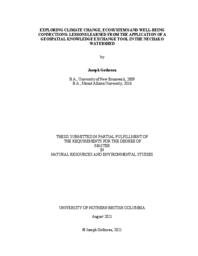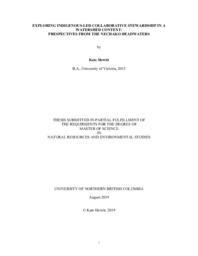Emmons, Scott
Person Preferred Name
Scott Emmons
Related Works
Content type
Digital Document
Description / Synopsis
The Nechako Watershed is a large system in northern BC that exemplifies the challenge of integrating information across climate, environment and well-being. This research responded to this need with the goal of enhancing how information about the Nechako Watershed is communicated and shared. Informed by the development of a geospatial ‘portal’ tool in northern BC, this research sought to establish the Integrated Watershed Research Group (IWRG) Portal, gain insight on establishing accessible knowledge exchange strategies, and identify its perceived benefits and limitations. The research had two phases. Phase I involved working with a development team to understand this tool, testing, establishing the IWRG Portal, finding and formatting content. Phase II brought members of the Portal User Research Group together to further refine the IWRG Portal and content through scoping discussions, workshops, and a focus group. Thematic analysis was used to code and analyze the transcribed focus group. The research identified benefits of the portal with how it dealt with complexity and its integrative features. Limitations were also found, including the need for intentional framing of data, a steep learning curve, and the need for an internet connection. Analysis also identified the need to tailor content for specific audiences. The research has shown that tools such as the IWRG Portal can create new pathways to understanding and finding information. The research has also identified paths for further refinement and development of the portal tool by expanding the user base and continuing to evaluate the effectiveness of this tool in various contexts.
Origin Information
Content type
Digital Document
Description / Synopsis
This research explores collaborative stewardship on a watershed scale and how local insight can assist in shaping collaborative approaches to culturally appropriate stewardship. The Cheslatta Carrier Nation (Cheslatta) have called the upper Nechako watershed home since time immemorial. They enjoyed a self-sustaining and peaceful existence until forced to leave when the waters started rising as their shores were flooded to create a reservoir. Regardless of adversity, Cheslatta have worked with passion and tenacity to restore the health of the upper watershed and the well-being of their people. Guided by Indigenous research approaches and appreciative inquiry, this research reviewed literature, documents and interviews with residents of the upper Nechako. The gathered data was then analyzed and themes were identified. The themes identified offer insights into local perspectives on stewardship, pointing especially to the ways reconciliation and community well-being can all be enhanced through cooperative and collaborative methods.
Origin Information
Content type
Digital Document
Description / Synopsis
With the continuous expansion of the oil and natural gas fields, there is growing concern regarding the impacts of oil and natural gas activities on the agricultural land base in northeast British Columbia. The Agricultural Land Commission (ALC) and Oil and Gas Commission (OGC) entered a binding contract, called the Delegation Agreement (DA), in an attempt to manage oil and gas activities on ALR lands and streamline the land use application process. However, with increasing activities in the region, too much prominence has been given to oil and gas development and not enough to farmland protection, which is the fundamental mandate of the Agricultural Land Commission Act (ALCA).
Origin Information



